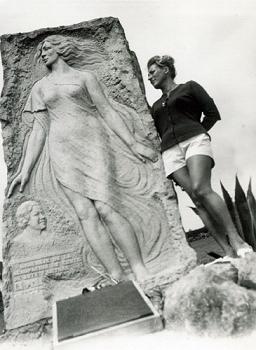|
La Loba
A la memoria de mi desdichada amiga J.C.P.
porque éste fue su verbo.
Yo
soy como la loba.
Quebré con el rebaño
Y me
fui a la montaña
Fatigada del llano.
Yo
tengo un hijo fruto del amor, de amor sin ley,
que
yo no pude ser como las otras, casta de buey
con
yugo al cuello; libre se eleve mi cabeza!
Yo
quiero con mis manos apartar la maleza.
Mirad cómo se rien y cómo me señalan
porque lo digo así: (Las ovejitas balan
porque ven que una loba ha entrado en el corral
y
saben que las lobas vienen del matorral).
¡Pobrecitas y mansas ovejas del rebaño!
¡No
temáis a la loba, ella no os hará daño.
Pero
tampoco riaís, que sus dientes son finos
y en
el bosque aprendieron sus manejos felinos!
¡No
os robará; la loba al pastor, no os inquieteís;
yo
sé que alguien lo dijo y vosotros lo creéis
pero
sin fundamento, que no sabe robar
esa
loba; sus dientes son armas de matar!
Ha
entrado en el corral porque sí, porque gusta
de
ver cómo al llegar el rebaño se asusta,
y
cómo disimula con risas su temor
bosquejando en el gesto un extraño escozor...
Id si acaso
podéis frente a la loba
¡Y
robadle el cachorro! no vayaís en la boba
conjunción de un rebaño ni llevéis un pastor...
¡Id
solas! ¡Fuerza a fuerza oponed el valor!
Ovejitas mostradme los dientes. ¡Qué pequeños!
No
podréis, pobrecitas, caminar sin los dueños
por
la montaña abrupta, que si el tigre os acecha
no
sabréis defenderos, moriréis en la brecha.
Yo
soy como la loba. Ando sola y me río
del
rebaño. El sustento me lo gano y es mío
donde quiera que sea, que yo tengo una mano
que
sabe trabajar y un cerebro que es sano.
La
que pueda seguirme que se venga conmigo,
pero
yo estoy de pie, de frente al enemigo,
la
vida, y no temo su arrebato fatal
porque tengo en el mano siempre pronto un puñal.
El
hijo y después yo y después... ¡lo que sea!
aquello que me llame más pronto a la pelea.
A
veces la ilusión de un capullo de amor
que
yo sé malograr antes que se haga flor.
Yo
soy como la loba.
Quebré con el rebaño
Y me
fui a la montaña
Fatigada de
llano.
|

